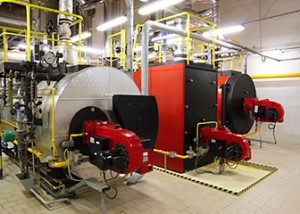Energy Efficiency Jobs
Stationary engineers and boiler operators ensure that buildings are supplied power in energy efficient ways.
Stationary engineers and boiler operators ensure that buildings are supplied power in energy efficient ways.
Stationary engineers and boiler operators maintain or operate stationary engines, boilers, or other mechanical equipment to supply utilities for commercial or industrial buildings. Commercial building such as malls and warehouses usually have large heating, ventilation, and air-conditioning systems. Industrial plants often have additional facilities to provide electrical power, steam, or other services. Stationary engineers and boiler operators are especially important in buildings that operate around the clock and need precise temperature control, such as hospitals. These green job holders hold the key in ensuring that equipment is operated in an energy efficient way to help reducing energy consumption for traditional and green buildings (LEED). They regularly control and maintain boilers, air-conditioning and refrigeration equipment, steam engines, steam boilers, motors, turbines, generators, pumps, and compressors to supply steam or heat for those buildings. Stationary engineers and boiler operators observe and interpret readings on gauges, meters, and charts registering various characteristics of boiler to ensure proper operation.
 As part of their job, stationary engineers and boiler operators monitor boiler water, chemical, and fuel levels, and make adjustments to maintain their required levels. They regularly test boiler water quality and take necessary corrective action, such as adding chemicals to prevent deterioration and harmful deposits to the equipment. They control valves to maintain required amounts of water in boilers, adjust supplies of combustion air, and adjust the flow of fuel into burners. Stationary engineers and boiler operators fire coal furnaces or gas feed boilers by hand or by using automatic gas feeds or oil pumps.
As part of their job, stationary engineers and boiler operators monitor boiler water, chemical, and fuel levels, and make adjustments to maintain their required levels. They regularly test boiler water quality and take necessary corrective action, such as adding chemicals to prevent deterioration and harmful deposits to the equipment. They control valves to maintain required amounts of water in boilers, adjust supplies of combustion air, and adjust the flow of fuel into burners. Stationary engineers and boiler operators fire coal furnaces or gas feed boilers by hand or by using automatic gas feeds or oil pumps.
Stationary engineers and boiler operators also regularly monitor and inspect equipment, computer terminals, switches, valves, gauges, alarms, safety devices, and meters to detect leaks or malfunctions and to ensure that equipment is operating efficiently and safely. They analyze problems and take appropriate action to ensure continuous and reliable operation of equipment and systems. They maintain daily logs of operation, maintenance, and safety activities, including test results, instrument readings, and details of equipment malfunctions and maintenance work.
The following are tools that stationary engineers and boiler operators often use in their jobs:
Stationary engineers and boiler operators work in a variety of industries, mostly in manufacturing, government, educational services, and hospitals. They often work in large commercial or industrial buildings. Some stationary engineers and boiler operators are exposed to high temperatures, dust, and loud noise from the equipment. Maintenance duties also may require contact with oil, grease, and smoke. They often spend much of their time on their feet. They also may have to crawl inside boilers and work while crouched or kneel to inspect, clean, or repair equipment. Most stationary engineers and boiler operators work full time during regular business hours. In facilities that operate around the clock, they usually work one of three 8-hour shifts on a rotating basis and many must work weekends and holidays.
Stationary engineers and boiler operators are required to have at least a high school diploma to enter the job. They typically begin their careers in mechanic or helper positions and learn their work through long-term on-the-job training by more experienced engineers. After training and gaining experience, they are eligible to advance to operator and engineer positions within that facility.
Stationary engineers and boiler operators can go through an apprenticeship programs sponsored by the International Union of Operating Engineers. Apprenticeships usually last 4 years, include 8,000 hours of on-the-job training, and require 600 hours of technical instruction. In this program they learn about the operation and maintenance of equipment, controls and balancing of heating, ventilation, and air conditioning HVAC systems, safety, electricity, and air quality.
Some state and local governments require licensure for stationary engineers and boiler operators. These state and governments typically have several classes of stationary engineer and boiler operator licenses. Each class specifies the type and size of equipment the engineer is permitted to operate without supervision. Many job openings require that stationary engineers and boiler operators be licensed before starting the job, although some jobs may offer apprenticeships. A stationary engineer or boiler operator who moves from one state or city to another may have to pass an examination for a new license because of regional differences in licensing requirements.
The Bureau of Labor Statistics (BLS) expects employment of this field to grow 13 percent from 2010 until 2020; about as fast as the average for all green jobs. The BLS projected 52,700 electrical power-line installers and repairers job openings between 2010 and 2020, and noted 108,000 jobs are currently filled. Titles included Boiler Operator, Stationary Engineer, Operating Engineer, Plant Utilities Engineer, Utility Operator, Fireman, Plant Operator, Stationary Steam Engineer, Boiler Engineer, and Boiler Tender. The BLS further reports that the median annual wage for salaried electrical power-line installers and repairers was $ 53,070 in 2011 with median hourly wage of $ 25.52. The lowest 10 percent earned less than $32,640, and the top 10 percent earned more than $73,580.